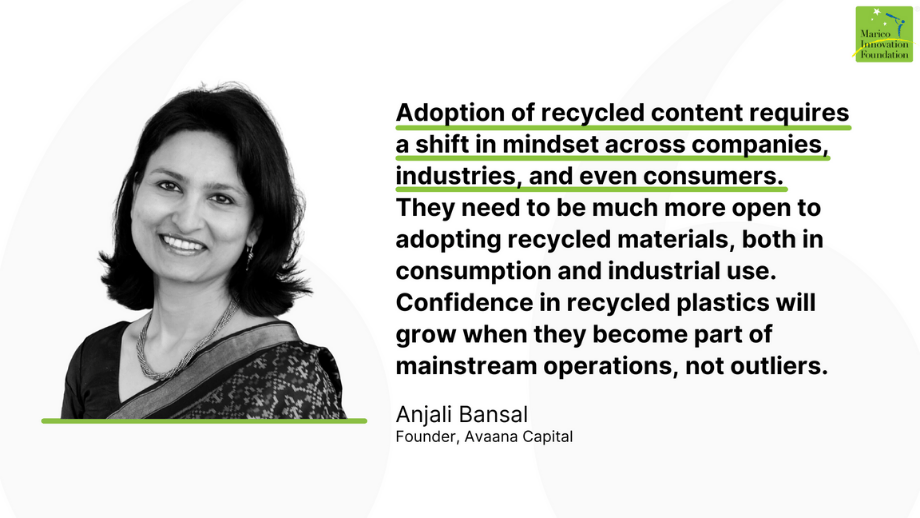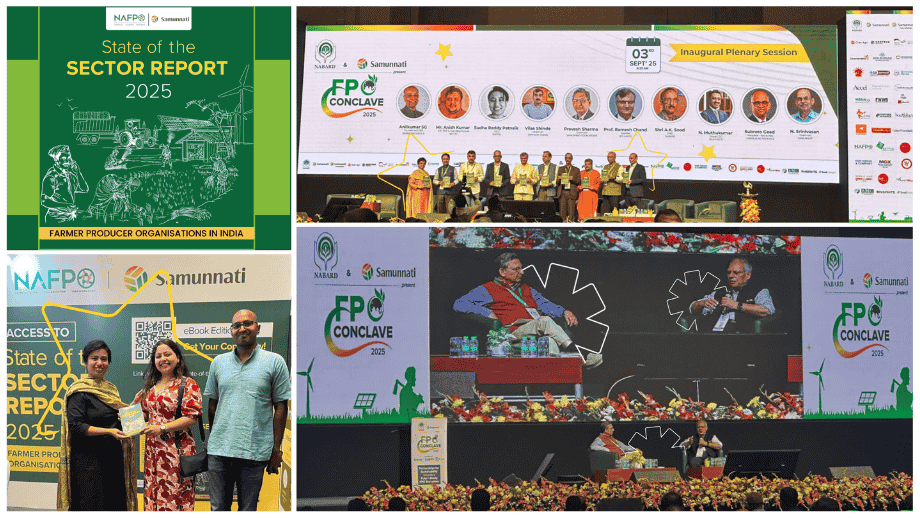Entrepreneurship
Innovation, Creativity, and Entrepreneurship: Cementing the Future
Upon close examination, innovation, creativity, and entrepreneurship form the synergistic bedrock that underpins wildly successful, high-impact businesses.
Recycled plastics are gaining ground in India’s industrial supply chains. Avaana Capital Founder, Anjali Bansal explains what needs to change across policy, and R&D for the industry to truly thrive.

Recycled plastics are no longer just a buzzword. They have moved beyond pilot pitches and environmental brochures to be integrated into real-world applications. But while adoption of recycled plastic is increasing, Anjali Bansal cautions that significant work remains.
As the founder of Avaana Capital, a climate and sustainability-focused investment platform, Bansal brings both investor insight and ecosystem perspective to the recycling industry. She shares what’s working, what’s missing, and how India can lead the transition to a circular economy.
Bansal points to the growing commercial interest in recycled plastics. She notes that recycled plastics are now finding their way into production processes by being reintroduced into the plastics value chain. They are also being used in post-production and post-consumption processes, by being integrated into areas like building materials, road surfaces, and consumer construction materials.
While the construction sector, a long user of recycled plastics in items like pipes and panels, continues to expand its applications, the packaging industry, traditionally reliant on virgin plastic, is now showing greater openness to recycled inputs. These shifts are not only creating markets for recycled plastics but also reinforcing the economic logic behind recycling.
Bansal outlines three persistent roadblocks facing the industry: policy gaps, industry adoption, and underdeveloped R&D infrastructure.
On the policy front, she acknowledges the role of India’s Extended Producer Responsibility (EPR) framework in creating market incentives for recycled material. However, she points to its uneven enforcement and inefficiencies that hinder scale.
“We need to double down on EPR compliance,” she says, emphasising the importance of building robust reverse logistics systems that make plastic collection cost-effective and help companies meet their obligations.
According to Bansal, creating cost efficiencies across the value chain and building reverse logistics systems is critical to the recycling industry. Without this foundational support, even the most promising technologies risk plateauing before reaching scale.
Bansal argues that industry must take the lead in the recycling sector. Large manufacturers can play a catalytic role by opening up their supply chains to pilot projects and startup integrations. This should not be seen as CSR, she cautions, but as part of long-term business resilience and responsibility.
Yet capital alone isn’t enough. Adoption of recycled content requires a shift in mindset across companies, industries, and even consumers. They need to be much more open to adopting recycled materials, both in consumption and industrial use.
Confidence in recycled plastics will grow when they become part of mainstream operations, not outliers.

For long-term change, India must deepen its investment in material innovation. “Currently, only 0.7% of our GDP goes into R&D,” Bansal points out, framing the gap as a missed opportunity in the sector.
While the government’s Anusandhan National Research Foundation—which promotes research and development across universities—is a welcome initiative, real transformation will come when academia, startups, and corporations co-create solutions.
Bansal advocates for a national-level R&D infrastructure for material innovation, structured around a hub-and-cluster model of pilot-scale labs. These, she says, are essential for sectors like biotech, advanced materials, and material science development.
Such infrastructure would allow startups to test, validate, and refine products in a controlled but scalable environment, removing much of the friction that currently prevents commercialisation.
As Bansal puts it, “It is critical if we are to continue the journey of recycling, taking recycled materials back, and ultimately reducing our reliance on materials that require recycling.”
From waste collection to research funding, the recycled plastics market hinges on ecosystem-wide collaboration. Avaana Capital follows an ecosystem approach to supporting startups. While it provides capital, the firm also invests in the intangibles: partnerships, market linkages, and ecosystem-building efforts that help early-stage ventures scale sustainably.
By backing innovations in climate-tech and material circularity, Avaana aims to create a future where recycled plastics are not the exception but the norm.
[The interview with Anjali Bansal, Founder Avaana Capital is part of MIF’s series, Ecosystem Voices to unpack the support required by startups working in plastic waste management and climate tech. The interview has been edited for length.]

Upon close examination, innovation, creativity, and entrepreneurship form the synergistic bedrock that underpins wildly successful, high-impact businesses.

Marico Innovation Foundation sees Farmer Producer Organisations as critical collaborators in building a climate-resilient, innovation-driven agri ecosystem.

From transforming chip packets into designer sunglasses to fighting India's crop burning crisis, these innovators are reimagining what's possible in India's sustainability sector.

Get insights from entrepreneurs, investors, and change-makers on innovation,
success and what it takes to get there.
